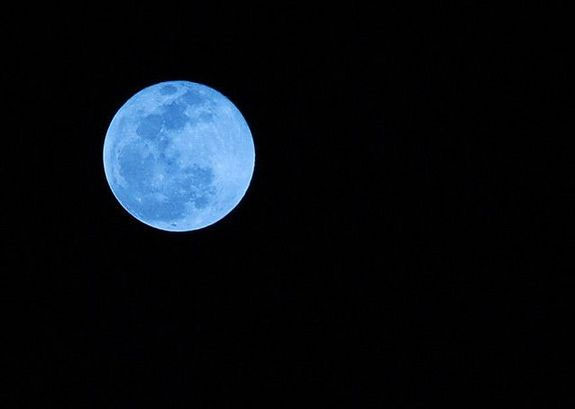'Werewolf' will appear tonight?
Tonight, Friday 31 August, people around the world will have the opportunity to admire the 'blue moon' - the second full moon phenomenon in the month, averaging 2.7 years and the next time. will happen in 2015.
In these days, the legend of the arrival of the werewolf on the full moon night was on the rise. Accordingly, many people believe in the close link between 'blue moon' and many unusual behaviors, so they are limited to going out until this phenomenon ends. In fact, however, scientists claim they have not found any evidence to prove it.

Many people believe that 'blue moon' is associated with these
unusual behavior. (Photo: HarveNYC / flickr)
In 1996, collecting information from more than 150,000 suburban hospital emergency rooms, the team found that there were no differences in the number of hospitalizations on the full moon night compared to the other evenings of the month. Nor did they detect any significant signs in the relationship between the full moon and mental abnormalities such as dementia, seizures or seizures. Most likely, the source of belief is what psychologists call a tendency to confirm, remember select information.
Although people are not affected, but what about animals? The results from a 2007 study in the Journal of the American Veterinary Medicine Association showed that the number of cats and dogs came to Colorado State University's animal emergency department on the night of the full moon with an increase compared to the day. often. Specifically, the proportion of cats admitted to cats increased by 23% while in dogs by 28%. In the UK, another study published in the British Journal of Medicine in December 2000 made the same conclusion after conducting statistics from a series of clinics.
Scientists cannot explain exactly why there is this connection, a hypothesis discussed that many people often take their pets out for a walk on bright moon days, from which the risk of injury Theirs is also higher.
Reference: Livescience
- Legend of werewolves
- Decode the werewolf obsession in real life
- Modern 'werewolf' and the most bizarre syndrome on the planet
- The Quang Binh boy grew hair like a werewolf
- Spot the 'werewolf' skull
- Tonight, do not miss the opportunity to see the big moon illusion
- Self-healing material like the werewolf skin
- The 'werewolf' 100% real version: Extraordinary, aggressive, attacks both polar bears
- Tonight there are meteor showers in Vietnam
- Tonight 'sun tsunami' fell on the earth
- Russian spacecraft reconnected with ISS tonight
- Tonight the smallest full moon of the year
 Van Allen's belt and evidence that the Apollo 11 mission to the Moon was myth
Van Allen's belt and evidence that the Apollo 11 mission to the Moon was myth The levels of civilization in the universe (Kardashev scale)
The levels of civilization in the universe (Kardashev scale) Today Mars, the sun and the Earth are aligned
Today Mars, the sun and the Earth are aligned The Amazon owner announced a secret plan to build a space base for thousands of people
The Amazon owner announced a secret plan to build a space base for thousands of people